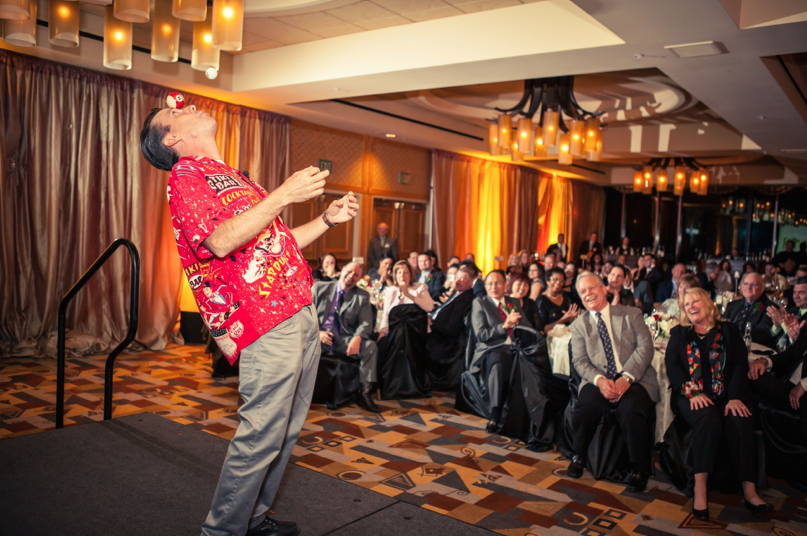
Over time, my stand-up comedy became a natural prelude to my “Unnatural Act”. Here I am performing face juggling with a billiard and a ping pong ball.
I didn’t start doing stand-up until my mid-thirties. I had a lot of experience speaking to audiences by that time, however: I had been performing for nearly two-decades as a comedy juggler. When I started hitting open-mics in Denver and elsewhere working on my first five minutes of stand-up material, I would walk on stage with a highlighter pen, a slap bracelet, two half dollars and a billiard ball neatly concealed in my pockets and a host of other time-tested accouterment. The moment I lost trust in (or, just as likely, simply blanked on) my stand-up material, I’d hit the eject button and break-out the props from my pocket and then could coast from there.
Sometimes I’d bail on the stand-up if I if I had the least little memory lapse. Not wishing to be seen looking at my crib sheet, if I had one, I’d simply bail and boom! my variety act would inflate in seconds and I was gold again.
When I stopped working with a crib sheet on the stage stool – it all seems so shabby now – is when I really progressed in terms of memorization (a facet of the job which was much less onerous than I feared when I realized I only have to memorize as I write, not commit to memory a 45-minute set.
Crib sheets are a crutch, not to mention an unwelcome distraction to the audience to see you pouring or – sometimes worse – glancing over your notes. Stand-up comedy is a conversation between the audience and the comedian. Why give them even a brief invitation to end the conversation?
Anyway, if I bailed on the stand-up (or just had more time to fill) I’d produce a highlighter pen from my pocket and and noticed an unmistakable increase in focus from the audience: the comedian is doing something unexpected and suddenly everyone’s curious about what’s going to happen next. That was a powerful thing to harness for me and has been ever since.
I learned the importance of being interesting at all times. I wish lecturers and teachers would learn this from the best comedians! It’s pretty simple: engage the audience and start telling jokes.
I learned to resist any urge to be explicit with the audience about demanding their attention: I pretended to just assume it. “Never let them see you sweat” became my mantra, if not my motto.
In terms of developing material I would have been better off without all those props, as all it did in the end was postpone my emergence from hypersensitive in terms of audience reaction to sort of a “Trust, but verify” approach: I don’t sweat any given moment but keep my eyes on the big picture.
And for the love of God, don’t be loud. What’s that? You have to “sell” the material? Please. Have you stood in the back of the room beneath the speakers and shouted into the microphone as you do? It’s horrible.
My friend and one of my favorite comedians in Jeff Wayne. He taught me a lot of valuable things. Among them was “Of course if a joke gets absolutely no response, you have to comment on it. But as long as you’re getting something – anything – from the audience, you’re best bet is to smile and get on with it.
A lot of it is the overall impression you leave with the audience during the show. Little things can undermine your credibility or like ability. Sometimes jokes stop being funny for no apparent reason. Easy come, easy go!
Many of my fellow open-mic comedians were the exact opposite. They seemed to be utterly oblivious to the audience’s non-reaction. I’d see the same guys week after week sharing onstage the same stories, telling the same anecdotes (rarely did they tell “jokes”, i.e., “As a comedian married to a German I sometimes have to go outside the marriage for laughs…” ). The hacks plow through their material like bloodthirsty wolverines, utterly indifferent to the audience’s reaction
I was the other way: I had to learn to resist my tendency to be hypersensitive and made even more so because I had in my pockets the comedy equivalent to the military’s meals Ready To Eat.
Another good rule of thumb I learned from Jeff: if you hear or see something from the stage that the audience can’t hear or see, forget about it. They don’t know what you’re talking about. Get back to the jokes.
It takes discipline to sit down and write daily, whether it’s a stand-up comedy bit, a blog or prose or fiction of any length. Writing what comes to mind throughout the day is easy: jokes, like trouble in New York, find me. I write throughout the day (except on those not-infrequent days when theres no signal) so that I can get on with my day. Staring at a blank screen while standing over the joke hole just doesn’t work for me. If I am going to transition to longer-form writing – maybe take baby steps with some two liners? – then I will have to learn to sit down and organize my thoughts. Just learning to be not-necessarily funny when writing is a challenge.
In the meantime, I have succeeded making my bed most days. The good Admiral McRaven is right: one of the satisfactions of making your bed each morning is repairing to it each night. Here’s my made bed.
Anyway, this signal I’ve been receiving makes my job mostly clerical: sorting the jokes by category (I keep every joke in a single document and hashtag it with one of the above routines that would likely provide cover for it. For example, a joke about my wife would be tagged with #family). I then gauge the jokes onstage with my patented “Tell joke, listen to audience reaction” stand-up comedy system.
I learned I wouldn’t write anything funny until I found I was performing it regularly. Looking back at my first notebooks I literally wonder: “What was I aiming at here?” The notebook was quiet and comfortable and never tested me. So the problem was I wasn’t going out there to perform stand-up enough. You have to be a writer and a performer – a rare combination.
At real gigs I’d throw in a line here or there during my show, but the audience wasn’t expecting stand-up and if they had, they would have been disappointed. A couple of reliable lines here and there, yes, but nothing qualifying as an actual bit.
I had to begin performing as a stand-up regularly to figure out who I was really writing for. My only clue to answer the question “What’s my persona gonna be?” was the from observing the patter and speaking-style I employed in my comedy juggling act. There was surely a lot of overlap in in my stand-up persona and my variety act persona – but whatever rough transition remained I hope I have polished into something deemed seamless.
I knew it important to meld the two modes together stylistically, especially since it became apparent that my juggling days were numbered. I have the advantage, too, that audiences tend to get giddy when my kind-of nerdy, boastful comedian personae suddenly gives way to this nerdy, boastful juggler persona who’s kicking a billiard balls into his eye socket and stuff.
Stand-up comedy also made me at once more self-aware and less self-conscious. I learned that I was kind of clever, not to mention preoccupied with TSA guidelines. Stylistically, I strive to be a pretty cool customer who manipulates the audience onto his wavelength without appearing to be striving do so. My motto is “Never let ’em see you sweat”.
When I finally started performing stand-up regularly – in-and-around Denver – I had an interesting perspective. Backstage, I’d be surrounded more-or-less relaxed open-mic guys who had more experience than me in stand-up but whose overall performing experience was dwarfed by my own (having performed some iteration of my comedy juggling act my whole adult life). I remember at one venue in a relatively small but beautiful old stone theater in Arvada we were told shortly before the show that the microphone wasn’t functioning and we’d simply do without.
Well, you could’ve knocked me over with a feather. For the other guys it seemed a minor detail. Holding a microphone in my hand was for me a welcome thumb to suck and served as a small equalizer between a novice like me, who had long grown accustomed to speaking with both hands free – and guys who had been hitting the open mic for months or years. In other words, holding a microphone was comforting luxury for me and deprived it I felt distracted. For them, it simply meant they’d have to do their act the way they’ve done it many times before: at other open mics, at home in the shower, driving, or whatever.
Memorization and desensitization were other big factors: memorizing my material and desensitizing myself from constantly checking the pulse of the audience and learning to simply charge on.
The microphone looms larger in the mind of comedians than most audiences will believe. What’s the big deal? Remove it from the stand and put it back when you’re done! But my friend and arguably world’s funniest man Phil Tag likes to rehearse his stand-up when possible on the stage with the lights under show conditions and the microphone on. For a guy who’s been doing it for decades and with appearances on The Tonight Show, you’d think he’d enjoy the comedian’s unique privilege of not requiring much, if any, tech rehearsal.
Over time, I would learn the lesson which I still apply to so many aspects of life: that most things that happen during a show are as big a deal to the audience as they appear to be to you. If doing your set without a hand-held microphone is no big deal to you, it will be a non-issue to the audience. The same goes for your bald head, paunch, cleft lip, whatever.
Mentally, I divide my stand-up into a handful of routines, or, to save time, I call “bits”. They are, in the generic order I do them, whatever that means:
family; drinking; work/little man; S.F. vs. L.V.;/gambling; dad; headlines; nude cruise; reading; credit/ID theft; stimulus/ hair gel/flying;
I did not write out any of these routines in anything close to a linear fashion. As outlined above, I just wrote stuff down throughout the day and over the above themes emerged and coalesced as I cherry-picked jokes like these.
By not straying from my comfort zone I’ve been able, over time, to generate a stand-up comedy act which aesthetically and temperamentally suits me nicely enough. If I am going to write anything of any length, though, I’ll l have to leave my comfort zone.
When I’m ready, I’ll let you know about it.
Thanks for reading,
Dave
Return to www.daviDDeeble.com
 Entertainers never tire of compliments. Sure, many are are generic or perfunctory, typically “Good show.” But in the main, compliments, rote or otherwise, are sincere expressions of appreciation.
Entertainers never tire of compliments. Sure, many are are generic or perfunctory, typically “Good show.” But in the main, compliments, rote or otherwise, are sincere expressions of appreciation.







